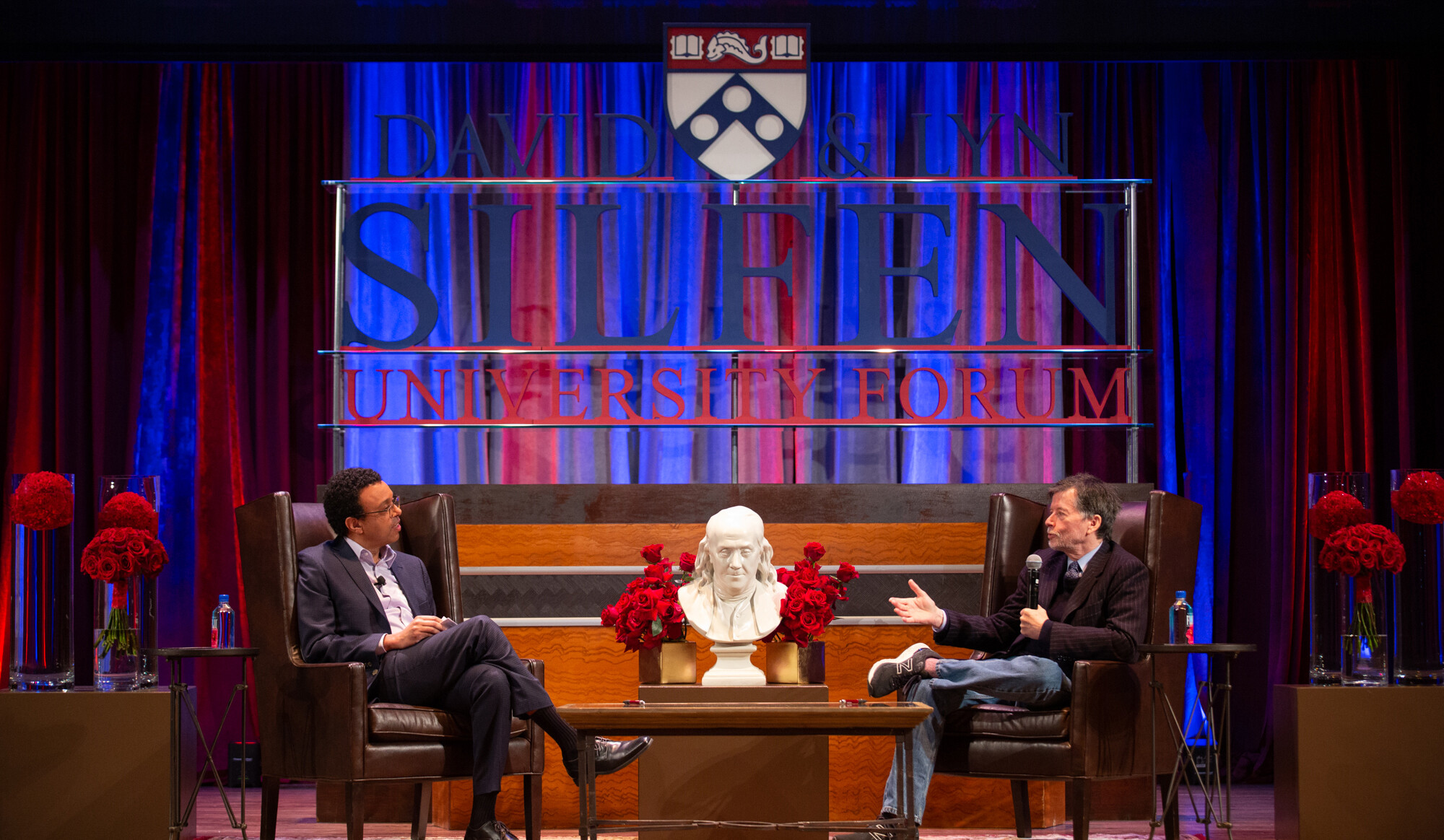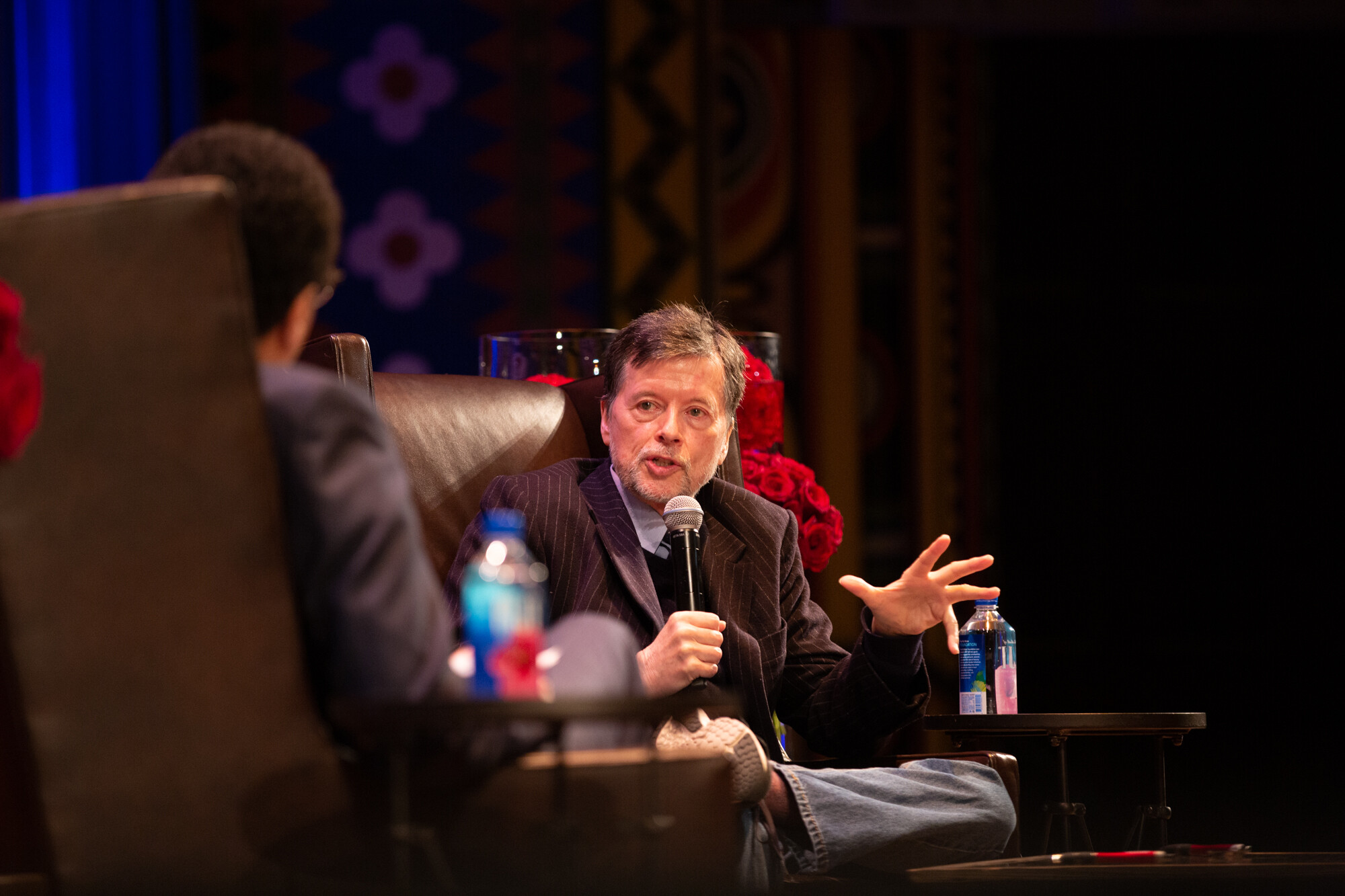
(From left) Doctoral student Hannah Yamagata, research assistant professor Kushol Gupta, and postdoctoral fellow Marshall Padilla holding 3D-printed models of nanoparticles.
(Image: Bella Ciervo)

At the David and Lyn Silfen University Forum, Penn Interim President Wendell Pritchett hosted award-winning documentary filmmaker Ken Burns in a wide-ranging discussion about Burns’ new documentary on Benjamin Franklin, founding father and founder of the University of Pennsylvania.
The hour-and-a-half chat discussed everything from how Burns’ view of Franklin transformed during the making of the two-part documentary, to the idea of Franklin as “the original social networker” who never stopped reinventing himself, to how so much of Franklin’s work has relevance today. The discussion was intermingled with short clips from the four-hour documentary that premiered earlier this month on PBS.
John L. Jackson Jr., the Walter H. Annenberg Dean of the Annenberg School for Communication and Richard Perry University Professor, introduced Burns and Pritchett, and noted how at so many major events at Penn, Benjamin Franklin or one of his aphorisms are typically invoked in a “quick and perfunctory gesture, even a ritualistic one,” before moving on to the subject at hand.
“Today, however, we’ve decided to pause on Franklin even more purposefully than usual by talking about the powerful filmic portrait of Franklin’s life offered up by Ken Burns,” Jackson said. After having the chance to watch the documentary himself, Jackson was struck by how Burns managed to portray the larger-than-life Franklin as truly human in his faults and accomplishments.
“This is a Franklin who isn’t reducible to pithy renditions of his most storied accomplishments. It is a decidedly multidimensional Franklin, and one that this particular Quaker—me—met again for the first time with new eyes through the film’s powerful storytelling.”
This is a Franklin who isn’t reducible to pithy renditions of his most storied accomplishments. It is a decidedly multidimensional Franklin.
Annenberg School of Communication dean John L. Jackson Jr.
Starting off the conversation, Pritchett noted that Burns has said in the past he doesn’t choose his documentary topics, but rather, they choose him.
“So how did Ben Franklin choose you?” Pritchett asked.
Burns, who is also the 2022 Penn commencement speaker and recipient of an honorary doctor of arts degree, said he’s drawn to topics with complicated stories and Benjamin Franklin represents exactly that.
“He’s arguably the most important founder, and I think he’s also the most interesting,” he said, noting Franklin was a teenage runaway who achieved such remarkable success that his example would be handed down for generations as the embodiment of the American dream.
Franklin was a writer, a publisher, an inventor, a scientist, a civic leader who embraced the Enlightenment, but he also owned and enslaved human beings and benefited from the institution of slavery, Burns said.
“He constantly remade himself from apprentice to printer to scientist to government official to revolutionary to abolitionist,” Burns said. “He never was finished with himself. He always thought that he was a work in progress.”
Burns said he doesn’t make films to highlight what he already knows but would rather “share with you a process of discovery, and the discovery of Franklin has been as satisfying as anything we’ve done over nearly 50 years making films.”

The talk then moved on to Franklin’s goals for establishing what would become the University of Pennsylvania, which was to create the first nonsectarian college in America, not beholden to any religious dogma.
“He felt it in his bones that education, the thing that he couldn’t have as a child, is central to everything … he wants to create enlightened human beings who will go about the process of enlightening their community,” Burns said. “As we look at the mess that we’re in right now, we see the decline of public education. He knew at the start of his experiment how much that public education would be important and worthwhile and beneficial.”
Pritchett also asked how actor Mandy Patinkin came to be the voice of Franklin in the film. Burns said Patinkin as Franklin came to him as he watched an episode of “Homeland” with his daughter, who he joked was likely too young to have been watching the show at all.
“He makes Franklin accessible and that’s a great gift,” he said of Patinkin.
The talk turned to the issue of slavery several times over the afternoon, including when Pritchett asked how Franklin’s thinking on the topic evolved over time.
[Franklin] constantly remade himself from apprentice to printer to scientist to government official to revolutionary to abolitionist.
Award-winning documentary filmmaker Ken Burns
Burns said the passing of the Constitution made the issue of slavery a huge topic because of the “hypocrisy of all the Southern planters who owned hundreds of human beings articulating that ‘all men are created equal’ and also using the language of slavery to describe what King George was doing to them. Either these rights are universal, or they weren’t.”
One of the great things that that Franklin did was to liberate the slaves in his own very small household and refuse to run advertisements for the sale of human beings or the return of runaways, Burns said. Franklin eventually became president of the Abolition Society.
“I don’t think you get a pass for that, but you get higher marks than any of the other white men who created the country,” Burns said.
The talk moved to audience questions, which addressed the craft of documentary filmmaking.
In the final question, one audience member asked Burns if he sees a connection between all his documentary subjects, from the Civil War to baseball, from jazz to Franklin.
“They’re all about us,” he said. “They’re asking the same question: Who are we? Who are those strange and complicated people who like to call themselves Americans? What does an investigation of the past tell us about not only what we’ve been, but where we are and where we may be going?”
Since 2009, the Silfen Forum has allowed for important conversation and debate in a public space. Late University Trustee David M. Silfen and his wife Lyn endowed the series, as well as funded two Penn Integrates Knowledge University professorships, the Silfen Student Study Center, a term professorship, and the David and Lyn Silfen Fund to support educational innovation in the School of Arts & Sciences. Previous forum topics have included political polarization and public debate, battling cancer, asylum and immigration, the opioid epidemic, and the future of higher education.
Video of the event is available on The Silfen Forum website.
Kristen de Groot

(From left) Doctoral student Hannah Yamagata, research assistant professor Kushol Gupta, and postdoctoral fellow Marshall Padilla holding 3D-printed models of nanoparticles.
(Image: Bella Ciervo)

Jin Liu, Penn’s newest economics faculty member, specializes in international trade.
nocred

nocred

nocred